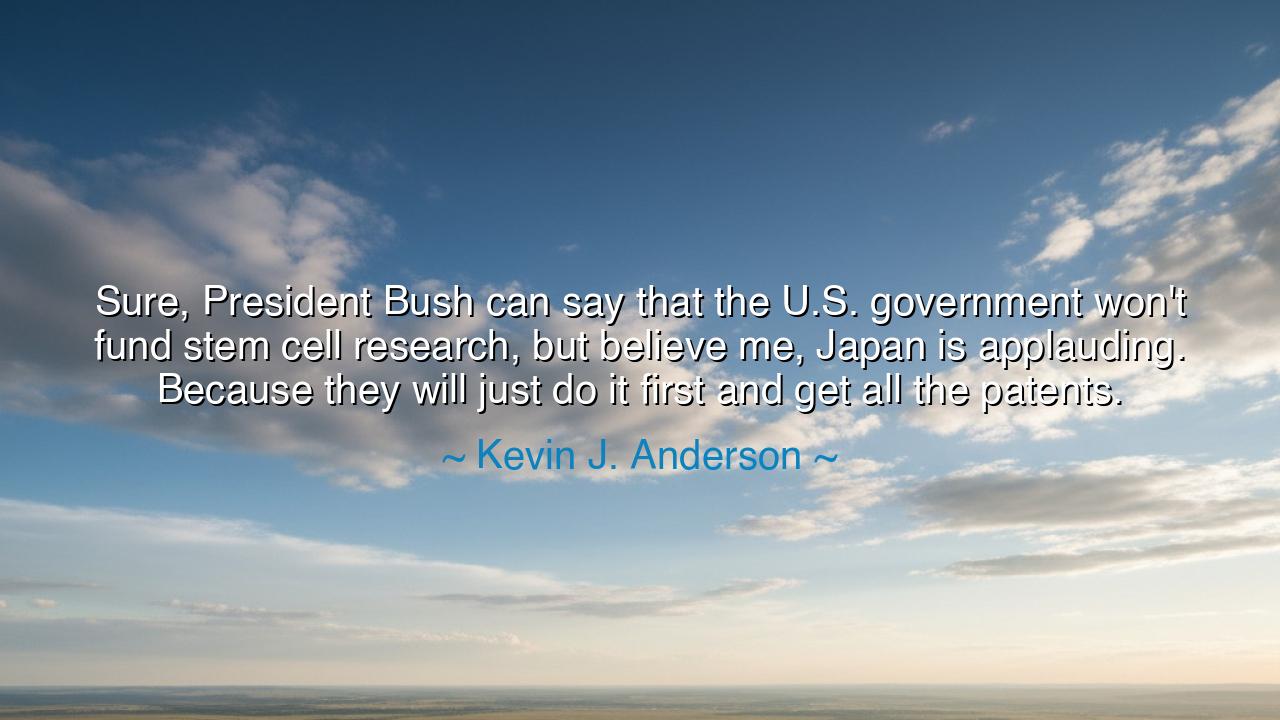
Sure, President Bush can say that the U.S. government won't fund
Sure, President Bush can say that the U.S. government won't fund stem cell research, but believe me, Japan is applauding. Because they will just do it first and get all the patents.






When Kevin J. Anderson declared, “Sure, President Bush can say that the U.S. government won't fund stem cell research, but believe me, Japan is applauding. Because they will just do it first and get all the patents,” he spoke not as a politician but as a seer of innovation, warning of a truth that transcends science and borders alike. His words strike with both irony and urgency — for they are not merely about stem cell research, but about the eternal competition between fear and progress, hesitation and boldness. Anderson, a novelist who often explored the meeting of human ambition and technology, understood that knowledge is the engine of civilization, and that to halt it, even for noble reasons, is to surrender the future to others more daring.
The origin of this quote lies in the early 2000s, during a heated debate in the United States over the ethics of stem cell research. President George W. Bush, guided by moral and religious concerns, restricted federal funding for research involving human embryos — a decision meant to uphold certain ethical standards. Yet to thinkers like Anderson, this restraint, though well-intentioned, carried grave consequences. In a world racing toward discovery, where nations compete not just in war but in wisdom, such hesitation could mean falling behind in the great contest of human advancement. His words were not condemnation but prophecy: that innovation, once halted in one land, would bloom elsewhere, and those who dared to move forward would reap both the knowledge and the power.
In the style of the ancients, one might say that Anderson’s quote is a modern parable about the dangers of fearful virtue — the kind of caution that disguises itself as morality but leaves the door open for others to dominate. Throughout history, those who hesitated at the edge of discovery watched as braver souls claimed the prize. When China turned inward during the Ming Dynasty, closing its ports and forbidding exploration, it ceded the seas to Europe. When the Ottoman Empire scorned the printing press, knowledge flowed westward, and its intellectual flame dimmed. So too, Anderson suggests, when a nation turns away from research, others will not merely applaud — they will inherit the future.
The story of Japan that Anderson invokes is no accident. In the late 20th and early 21st centuries, Japan was renowned for its relentless pursuit of technological mastery. From robotics to regenerative medicine, it became a nation defined by curiosity and discipline. When the U.S. government slowed its progress in biomedical research, Japan and other nations accelerated theirs. They invested, experimented, and patented — quietly building the foundations of a new era of medicine. This was not greed, but recognition of a timeless law: knowledge favors the persistent, not the hesitant. The world does not pause for one nation’s moral dilemmas; it moves forward, with or without them.
Anderson’s warning, therefore, carries an emotional and moral depth far beyond economics. He reminds us that progress demands courage — that innovation is never without risk, yet to refuse it out of fear is to betray the human spirit itself. Every discovery, from fire to flight, from the printing press to the microchip, has been shadowed by doubt. Yet the destiny of humankind has always belonged to those who dared to seek, even when the path was uncertain. To deny exploration in the name of safety is to bind the wings of the mind, and once bound, they may never soar again.
But his words also reveal another truth — that moral conviction and scientific curiosity need not be enemies. A wise society must not choose between ethics and advancement, but find harmony between them. To move blindly toward progress without conscience is perilous; but to refuse progress in fear of imperfection is equally so. The ancients would have said: The blade must be tempered, not discarded. Innovation must be guided by wisdom, but wisdom must never become paralysis. Anderson’s insight is thus a call not for recklessness, but for balance — for nations to act boldly, yet justly, in the pursuit of knowledge that serves life and not vanity.
The lesson of Kevin J. Anderson’s words is both practical and timeless: the future belongs to those who move forward, not to those who stand still. In every field — science, art, or governance — the same principle holds true. Those who hesitate, fearing controversy or criticism, will watch as others seize opportunity. Those who act with vision, guided by conscience but unafraid of challenge, will shape the course of history. Every generation faces this choice: to build upon the discoveries of the past or to let fear halt the march of progress.
So let this teaching be remembered: knowledge does not wait for permission. The tides of innovation cannot be stopped by decree. If one nation or one mind refuses to advance, another will step forward. Therefore, let the people of every land seek wisdom, not just comfort; courage, not just caution. For when the brave press onward — in science, in art, in truth — they carry the torch of humanity’s endless ascent. And when others merely applaud from the shore, the ship of discovery sails without them, into the bright and boundless sea of tomorrow.






AAdministratorAdministrator
Welcome, honored guests. Please leave a comment, we will respond soon